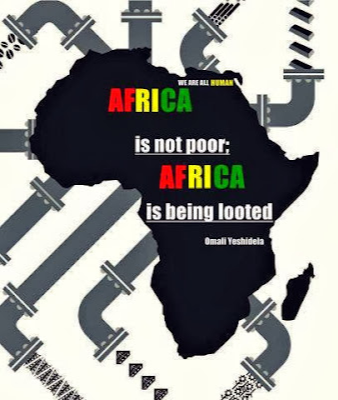
Rich European nations’ race to gain access to African natural gas reserves has raised concerns among climate activists at COP27 United Nations Climate Change Conference underway in Egypt.
Cairo, November 15 (RHC)-- Rich European nations’ race to gain access to African natural gas reserves has raised concerns among climate activists at COP27 United Nations Climate Change Conference underway in Egypt.
Europe wants "to turn Africa into its gas station," said Mohamed Adow, director of the Power Shift Africa think tank, at the UN climate summit in Sharm el-Sheikh on Tuesday as quoted in an AFP report. "We don't have to follow the footsteps of the rich world that actually caused climate change in the first place," he added.
The remarks came as wealthy Western countries, facing an energy crunch as the result of the ongoing Ukraine conflict and the cut-off of Russian gas supplies, are eyeing natural gas reserves amid charges by climate activists at COP27 that the move is intended to deny “green transition” to impoverished African countries.
European countries have been scrambling for alternative sources of gas after the continent's former top supplier slashed exports in apparent retaliation for US-led Western sanctions over the Russian military operation in Ukraine that began in February.
According to the report, Europe sees great potential in African fossil fuel reserves, including promising oil and gas discoveries in Senegal and the Democratic Republic of Congo. However, activists, researchers, and advocacy groups argue that exporting natural gas may bring short-term profits to some African nations but will further worsen the climate crisis and leave the poor countries worse off in the long run.
Citing research group Climate Action Tracker, the report describes the global race for gas as a "serious threat" to the Paris Agreement goals -- of keeping global warming well below two degrees Celsius, and preferably at 1.5 degrees compared to pre-industrial levels. Some African leaders argued the potential benefits for people on the world's poorest continent outweighed the harm from the production and export of fossil fuels.
"We are in favor of a just and fair green transition, instead of decisions that harm our development process," Senegalese President Macky Sall asserted while addressing nearly 100 world leaders last week at COP27.
This is while Germany -- the European country most dependent on Russian supplies before the war -- has expressed keen interest in tapping Senegal's gas deposits. However, Secretary General of the African Petroleum Producers' Organization Omar Farouk Ibrahim argued that the slight increase in the continent's marginal contribution to greenhouse gas emissions "would make a fundamental difference in whether people live or die."
"We have 600 million people in Africa who don't have access to electricity at all. We have over 900 million people in Africa who do not have access to the modern forms of energy for cooking or domestic heating," he emphasized. "No progress can be made in any society without energy." Moreover, advocacy groups did not appear convinced that Africa's poor would reap any benefits.
"History shows us that... extraction in African countries has not resulted in development," said Thuli Makama, African program director at Oil Change International.

